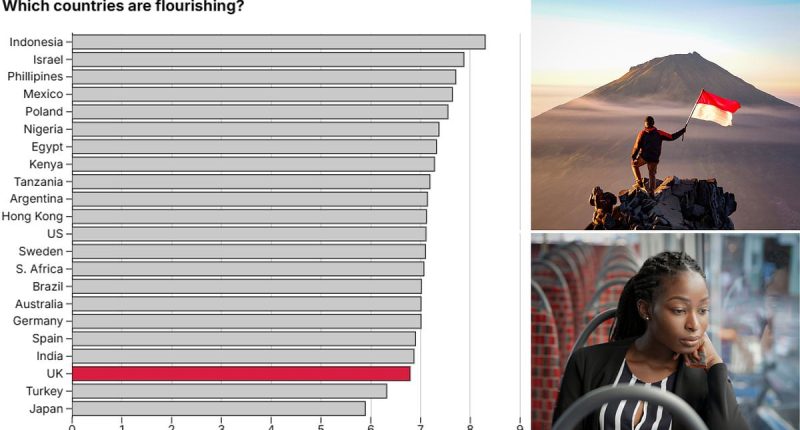Share this @internewscast.com
A new study has revealed the countries where people ‘flourish’ the most – and it’s bad news for Brits.
Scientists from Harvard University surveyed more than 200,000 people from 22 countries about their health, happiness, meaning, character, relationships, financial security, and spiritual well-being.
Together, these seven variables were defined as ‘flourishing’ by the researchers.
The results revealed that people living in Indonesia are flourishing the most, followed by Israel, the Philippines, and Mexico.
In contrast, the US ranked 12th on the list, while the UK ranked a dismal 20th out of 22.
According to the researchers, the findings highlight the old adage that money isn’t everything.
‘Flourishing is multidimensional, and different countries are flourishing in different ways,’ the team wrote in their study.
‘While many developed nations report comparatively higher levels of financial security and life evaluation, these same nations are not flourishing in other ways, often reporting lower meaning, pro-sociality and relationship quality.’

The results revealed that people living in Indonesia (stock image) are flourishing the most, followed by Israel, the Philippines, and Mexico
Several previous studies have set out to understand the happiest countries around the world – with Finland usually taking the top spot.
However, until now, there has been little research into how people are flourishing.
Writing in their study, published in Nature Mental Health, the team, led by Tyler VanderWeele, explained: ‘The study is intended to expand our knowledge of the distribution and determinants of flourishing around the world.’
The team enrolled 203,000 people in 22 countries spanning all six populated continents.
According to the experts, this represents about 64 per cent of the world’s population.
The participants were surveyed across the seven variables, as well as demographic data such as age, sex, marital and employment status, education, health, religion, and personal history.
The results revealed that Indonesia topped the list, with a flourish score of 8.3.
This was followed by Israel (7.87), the Phillipines (7.71), Mexico (7.64), and Poland (7.55).

In contrast, the US ranked 12th on the list, while the UK (stock image) ranked a dismal 20th out of 22
While Indonesia is not the wealthiest country, it ranked highly in measures of relationships and pro-social character traits, which foster social connections and community.
At the other end of the scale, Japan was found to be the country where people flourish the least, with a dismal score of 5.89.
This was followed by Turkey (6.32), the UK (6.79), India (6.87) and Spain (6.9).
Japan is wealthier and its people live longer, however respondents there were the least likely to answer ‘yes’ to a question asking whether they had an intimate friend.
Brendan Case, associate director for research at the Human Flourishing Program and an author of the study, explained: ‘We’re not here to say those outcomes [wealth, longer lifespans] don’t matter a lot, or that we shouldn’t care about democracy, we shouldn’t care about economic growth, we shouldn’t care about public health.
‘But it’s interesting to consider that the Global Flourishing Study raises some important questions about the potential tradeoffs involved in that process.’
The results also uncovered a link between age and flourishing – with older participants scoring more highly than younger respondents.
‘On average, when pooled across the 22 countries, flourishing is essentially flat with age through ages 18–49 and then increases with age thereafter,’ the researchers explained.
‘This is in striking contrast to earlier work—focused mostly on life satisfaction/evaluation—which had suggested a more dramatically U-shaped pattern with age.’
The findings raise important questions for the future progress of society, according to the researchers.
‘Are we sufficiently investing in the future given the notable flourishing-age gradient with the youngest groups often faring the most poorly?’ they asked.
‘Can we carry out economic development in ways that do not compromise meaning and purpose and relationships and character, given that many economically developed nations are not faring as well on these measures?
‘With economic development and secularization, have we sometimes been neglecting, or even suppressing, powerful spiritual pathways to flourishing?
‘If society is to ultimately flourish these questions of age, and of development, and of spiritual dynamics need to be taken into consideration.’








